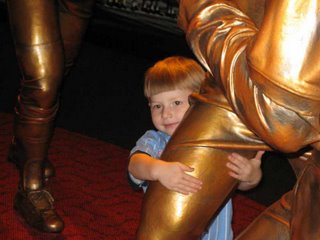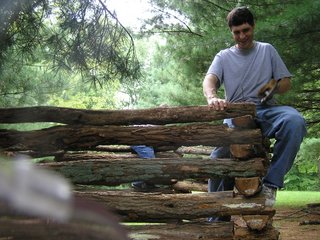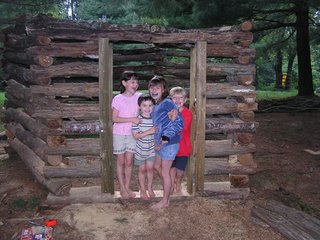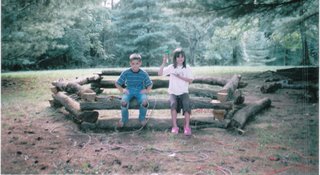Happy New Year, everyone. I think this music video is most appropriate for this time of year, U2's "40." This song came out on their 2nd or 3rd album, New Year's Day, and it isn't recognized as one of their hits, but they have a tradition of ending every concert with it. The chorus is haunting: "How long to sing this song? How long to sing a new song?" If you make it to about minute 5 of the video, you will see how the crowd picks up the chorus. A friend of mine told me about a U2 concert he attended in Los Angeles where the crowd had continued singing this chorus for about 20 minutes after the band left the stage. They simply couldn't get enough of the wishes expressed in this song. You can see what an event it is to be at a U2 concert--almost a religious experience.
"40" is based on the 40th Psalm:
You set my feet upon a rock,
you make my footsteps firm,
You lifted me out of the pit
out of the muddy clay.
Many will see and fear and put their trust in You.
How long to sing this song?
How long to sing a new song?
This song is transcendant. And for your new year of 2007, I look forward to new songs of faith and victory, despair and redemption, comfort and happiness that will be sung in your household, even as we look forward to a singing a new song in a new heaven and a new earth.
HAPPY NEW YEAR!
31 December 2006
A New Year's Wish: U2's "40"
30 December 2006
Guest Blogger: A Poem from Jenny
Helpless
If prayer is a state of helplessness
Let me constantly be praying.
Then
I will recede to make way for Your
Torrent-rush
Of Light, Love
Healing, Hope,
Abundance,
Peace.
I will shrink
So You can grow, flourish, occupy
The space inside my heart –
Pushing, Stretching, Reaching,
Till my heart,
Like Yours,
Has room to hold
the weakest,
Poorest, most un-loved . . .
Hold them tight until
That torrent-rush
Surrounds them, heals them,
Makes them Whole.
I will die
So, like a seed dropped in the ground,
My faith will burst, break, branch on branch,
Leaf on leaf,
A fully-riped, lovely tree
From whose topmost branches
I can glimpse where we are going:
A land of impossibles
That are real;
Of ugliest
Who are beautiful;
Of unloved
Who are precious, dear,
The apple of Your eye;
Of sickest, most in pain
Running, dancing, and in health -
A place we only find
When we are helpless.
-- Jenny
28 December 2006
All Creatures of Our God and King
David Crowder seems too cool to be a Christian musician. He looks like a 90s-era grunge rocker from Seattle with his fuzzy hair and his long goatee. But he makes some of the most compelling Christian music out there.
I find myself returning again and again to his version of "All Creatures of Our God and King." First, it's one of my favorite hymns of all time. Yet with Crowder, it seems really cool. We sing this version at my church pretty regularly, and it always brings me close to God in praise.
Enjoy!
26 December 2006
One Christmas Tradition
 I like to refer to my home as the "Ole Manse."
I like to refer to my home as the "Ole Manse." 21 December 2006
Christmas with the Ditteses
At three years old, Jonah is "with-it" enough this year to understand what's going on. (The last few years he hasn't really known what was going on.) Now he cannot wait.
Today (my first full day off from school), he spent the morning playing with the wrapped presents under our Christmas tree. He puts half of them on one chair, the other half on the couch. He stacks them carefully, knocks them down, and then stacks them carefully again.
Of course, all this reminds me of when my sister and I were growing up. We carefully counted the presents to make sure everything was equal. Then we would stack them up and pretend they were trains, pipe organs, and any other items we could imagine. Christmas was fun, fun, fun!
It's fun again this year, thanks to Jo-Jo.
15 December 2006
Georgia Aquarium

14 December 2006
Ozymandias
For the final project for the year, I'm having my seniors dramatize a British poem from the 19th or 20th Centuries. Several groups are planning videos or slide shows, and I have opened a YouTube account, hoping to eventually post some of my students' work.
As I was researching poem-related videos, I came across this gem, entitled "Ozymandias."
The words aren't included in the video, so I'll post them below. Enjoy.
I MET a Traveler from an antique land,
Who said, "Two vast and trunkless legs of stone
Stand in the desart. Near them, on the sand,
Half sunk, a shattered visage lies, whose frown,
And wrinkled lip, and sneer of cold command,
Tell that its sculptor well those passions read,
Which yet survive, stamped on these lifeless things,
The hand that mocked them and the heart that fed:
And on the pedestal these words appear:
"My name is OZYMANDIAS, King of Kings."
Look on my works ye Mighty, and despair!
No thing beside remains. Round the decay
Of that Colossal Wreck, boundless and bare,
The lone and level sands stretch far away.
America's Team, American Trauma
There are other things that make me cringe. The latest is plans for a new football stadium for the Dallas Cowboys in Arlington, Texas. This baby costs a whopping $1 billion. It will seat 80,000 people, and it features the following luxuries: a massive dining room from which people can gorge themselves (if they have room after tailgating) while watching the game on big-screen TVs, a massive 60-yard-wide, 50-foot-high, four-sided, basketball-style scoreboard that will hang from the middle of the stadium and broadcast replays and a healthy share of advertisements; and a locker room for the 53 football players that is as big as a WalMart Supercenter!
 Let's review, shall we?
Let's review, shall we?- WalMart-sized locker room
- 180 X 50-foot scoreboards
- $1 billion
What is it going to do the other 353 days of the year? I guess it will shine really nicely. They might even play a Super Bowl there or a college bowl game!
I remember traveling through Germany in 1996 and realizing how public works reveal the values of a society. In the Dark Ages, vast proportions of the economy were utilized to build castles and fortifications for societies that valued security. In the Middle Ages, vast sums went into building churches across Europe, again emphasizing the piety of the populace. Other ages have been devoted to transport, space, and public buildings.
From 1994 to the present day, America has indulged itself in an orgy of stadium-building. Every city now has one or two new, shining arenas or stadiums. You can't miss them in places like Nashville, Oklahoma City or Phoenix. And why? Is this what ages that are to come will judge us by? Are they going to say, "America was a great nation that invested in its sports teams"?
The last thing our country (or our planet) needs is a football stadium like this. It is a colossal waste of money, and I consider it to be a national embarrassment.
13 December 2006
Profound Thoughts
Owen had the comment of the night. Out of the blue he said, "I don't think they have pizza delivery in Antarctica."
What do you do with a statement like that? We were speechless for the next few minutes until Jonah was finally able to bring the conversation around again.
07 December 2006
Christmas Idea
 I'm getting into the music of the season this year.
I'm getting into the music of the season this year.I downloaded a CD of Christmas Carols from the Stuttgart Boys Choir for my Grandma. He is in a nursing home, and I felt that playing German carols might light up some parts of his mind that haven't been used since he was a child, growing up in a German home in Brooklyn, NY.
Of course, I love them, too.
I want to emphasize Andrew Peterson's place on my Christmas listening list, too. Three years ago, he came out with a Christmas CD called Behold the Lamb of God. I love it, because throughout each, original song, he iterweaves the story of Christ's coming to redeem us with God's own redemption of the Children of Israel. By clicking this link, you can go to his web site. If you click, Open Player, you will go to the album, so you can listen to whichever song you like (you'll have to buy it, however, to download any songs for yourself).
I recommend "Deliver Us" and "Behold the Lamb of God." If you want to hear unbridled, brilliant songwriting, check out "Matthew's Begats." Amazing.
Merry Christmas!
05 December 2006
Andrew Peterson - Holy is the Lord
This is my second try with this. I was trying to edit the text in my blog, but apparently I can't do that. This is the one post on my blog that I just can't get enough of. Andrew Peterson, folks, he is my absolute favorite Christian singer, bar none!
The Mouths of Babes
 I was walking back to the van Sunday night, and Jonah just took off. He ran forward and touched the door of the van and triumphantly shouted, "I beat you!"
I was walking back to the van Sunday night, and Jonah just took off. He ran forward and touched the door of the van and triumphantly shouted, "I beat you!"29 November 2006
Persia and Monotheism
This is what I absolutely love about being a believing Christian, by the way. I love how the Bible has answers to more questions than we could ever imagine even asking. All we have to do is seek...and find.
So here were some questions that I asked:
What if there were one point in the Bible at which I could say--there, they get it! The Jews are finally monotheists and they aren't going back!
What is there were one person or prophet--a proto-Messiah--who could be identified as the lynchpin of monotheism? Who could he be?

- the Persians have no images of the Gods, no temples nor altars, and consider their use a sign of folly. This comes, I think, from their not believing the Gods to have the same nature as men, as imagined by the Greeks.
- I am Cyrus, King of the World, Great King, Legitimate King, King of Babylon... When I entered Babylon as a friend and when I established the seat of the government in the ruler's palace with jubilation and rejoicing, Marduk, the grat god, induced the magnanimous inhabitants of Babylon to love me, and I daily endeavored to worship him... I returned to the sacred cities on the other side of the Tigris, the sanctuaries which have long lain in ruins, as well as the images which used to live in them... I also gathered all their former inhabitants and returned them to their homes.
27 November 2006
Book Review: Malinche

24 November 2006
Thanksgiving Giving
 Compared to most American Thanksgivings this week, ours was a relaxed affair. We had celebrated early (see Lion King post below for the details), so we just invited my mom and dad over for a nice lunch.
Compared to most American Thanksgivings this week, ours was a relaxed affair. We had celebrated early (see Lion King post below for the details), so we just invited my mom and dad over for a nice lunch.
23 November 2006
Jenny's Birthday

Upgrade Pains
I've been having trouble with BloggerBeta. It takes several tries to get logged in, and I'm not sure that the improvements are all that significant other than the fact that Google now apparently has another way to snoop on my life.
I downloaded Internet Explorer 7 onto my computer at work, and I really like it. It makes it possible to feature several different "tabs" on the same page. That way, instead of clicking tabs along the "START" bar at the bottom of the screen, all the tabs are on the same browser. It is also possible to hide the menu bar at the top so that it only pops up when the curser is there (kind of like it's possible to program the menu bar at the bottom of Windows to go away). This makes full-page viewing really cool.
I didn't have any trouble with the IE7 browser at work, but when I downloaded it onto my desktop at home, I was unable to get onto the Internet anymore. I eventually had to delete IE7. Once it was gone, I got on the Internet without any trouble. I think it conflicts with my DSL, and I've heard some other people complaining about this problem.
Needless to say, I need to wait for more of the kinks to be worked out before upgrading some of these programs!
18 November 2006
Babylon and Monotheism (1)
A couple of weeks ago, I entered into a study of Josiah the Great. Ruling just a generation before the destruction of Jerusalem, Josiah was a final breath of grace before generations of suffering. Josiah was a revolutionary: one who implemented monotheistic reforms throughout the kingdom, starting in his own backyard.
I once saw monotheism as a belief that unified Israel in its history from the days of Abraham through to the time of Christ (and even on to today). I think a careful study of the Old Testament shows, however, that monotheism was an exception rather than the rule. Certainly, the writers of the Old Testament hold Yahweh-centered views of history, yet time and time again, the worship of idols comes up. How many times does the Bible say, "After the days of X the people lost their love of God and slipped into idolatry."
Considering how rare Yahweh worship was in Israel, it might be more accurate to state, "During the days of X, Israel lost their devotion to Baal/Ashtorah and slipped into Yahweh worship." The Bible clearly proves that voices for God existed throughout Israel's history--indirectly, it also states that those voices were distinct for their loneliness.
A good way to understand this is to look at the extraordionary rule of Josiah (640-609 BC). The 23rd chapter of 2 Kings describes some of the activities he took in his reforms. They included (a) tearing down the Ashterah pole inside Solomon's temple (around which orgiastic dances where held on feast days); (b) tearing down the dormitories for male prostitutes located in the courts of the temple. This doesn't sound like an idolatry hiccup--in fact it makes me wonder if Solomon's Temple had ever been used in Yahweh worship after its famous dedication.
For example, not the story of Josiah as told in 2 Chronicles 35. In the Book of the Law found in the Temple, Josiah learns of the Passover ceremony, and he orders Israel to follow it. The writer of Chronicles remarks upon how remarkable that celebration was:
The Passover had not been observed like this in Israel since the days of the
prophet Samuel; and none of the kings of Israel had ever celebrated such a
Passover as did Josiah (verse 18)
None of the kings of Israel? That means that David hadn't celebrated Passover, neither had Solomon or Asa. (This may be inaccurate, because the writer of 2 Chronicles uses Chapter 30 to celebrate Hezekiah's own renewal of Passover.) So what had these kings been doing? How had the people of Judah worshipped? It seems evident that the worship of God was very, very different prior to Josiah and immediately after his extraordinary reign.
So how did it change? How did the monotheistic worship of Yahweh move from the fringes of Judahite society into the hallmark of Judaism?
I'll need another post to fully answer that question.
06 November 2006
Lion King
 What a great weekend this was. My sister, Julie, flew up from their home in Savannah, Georgia. On Sabbath we had a pre-Thanksgiving get-together with the Dittes side of the family. All my aunts and uncles were accounted for, as well as three of six cousins (I was missing Norman, Aaron, and freshman-in-academy Rachael, for the record).
What a great weekend this was. My sister, Julie, flew up from their home in Savannah, Georgia. On Sabbath we had a pre-Thanksgiving get-together with the Dittes side of the family. All my aunts and uncles were accounted for, as well as three of six cousins (I was missing Norman, Aaron, and freshman-in-academy Rachael, for the record).On Sunday, we celebrated the other reason for Julie's trip to TN: the Lion King touring Broadway show at the Tennessee Performing Arts Center in Nashville.
I have strong opinions about the Lion King movie, and I must admit that the musical wasn't high on my list of Broadway plays--I'm waiting to see Wicked and The Producers, among others. In many ways The Lion King ruined a string of classic Disney animated movies that had stretched from The Little Mermaid, through Beauty and the Beast and Aladdin. One reason was the death of lyricist Alan Mencken. Another was that Disney invested in specatcle more than story: big-time rock star, Elton John, as composer, and gee-whiz graphics. But there wasn't a sould to the story. Once you got away from the cute songs and the Hamlet-based script, there was nothing timeless or magical like B&B. I left the theater after Lion King thinking, "that was cool." Conversely Beauty & the Beast had me thinking, "I could live in that world," just like a little kid.
The Lion King was coming, and my mom--who instilled her love of Broadway musicals into me as a kid--was determined to have the kids see it. Julie was coming, too. This production had puppets! Whew-hoo-de-doo.
So what happened? I loved it. There are about six new songs that bridge together the parts of the story that grown-up JD relates to. The character of Mustafa, something of a cypher in the movie, is brought out with the new song, "They Live in You," relating his hopes for Simba. It was the first song to really connect on a spiritual level, and it set up the incredible response that Simba sings with Raffiki, prior to the climax.
Jenny and Ellie's favorite addition came in the song, "Shadowlands," sung by adult Nala (Simba's love interest) as she leaves Pride Rock. Wonderful characterization. It really worked.
 With that said, some of the parts I didn't like were holdovers from the cartoon. If you thought that "Can You Feel the Love Tonight?" was one of the cheesiest moments on film in the 1990s (like I did), you'll want to cover your eyes (and those of your kids) as Simba and Nala sing it (see picture, right) with a PG-13 backdrop of ballet dancers in suggestive poses.
With that said, some of the parts I didn't like were holdovers from the cartoon. If you thought that "Can You Feel the Love Tonight?" was one of the cheesiest moments on film in the 1990s (like I did), you'll want to cover your eyes (and those of your kids) as Simba and Nala sing it (see picture, right) with a PG-13 backdrop of ballet dancers in suggestive poses.I guess the kids had been a big worry before we went there. The guy on Channel 4 recommended taking kids no younger than five, and we had Jonah (3) and Julie's two
 sons, (ages 4 and 2). I was so worried that Jonah would get bored, throw a fit, and cause us to waste a $70+ ticket. As it turned out, however, Jo-Jo made it through. (Julie's baby fell asleep during the first song and didn't wake up again.) The costumes are wonderful, and the unique ways that the actors/puppeteers bring out the characters are truly creative. I especially enjoyed the work done by the puppeteer controlling Zazu. (Right, during the song "I Just Can't Wait to Be King" with young Nala and Simba.)
sons, (ages 4 and 2). I was so worried that Jonah would get bored, throw a fit, and cause us to waste a $70+ ticket. As it turned out, however, Jo-Jo made it through. (Julie's baby fell asleep during the first song and didn't wake up again.) The costumes are wonderful, and the unique ways that the actors/puppeteers bring out the characters are truly creative. I especially enjoyed the work done by the puppeteer controlling Zazu. (Right, during the song "I Just Can't Wait to Be King" with young Nala and Simba.)In the end, it was a great weekend with great people. We finished with a trip to the Old Spaghetti Factory--a tradition Julie and I have enjoyed since we were kids and our big summer events were Reds games in Cincinnati.
02 November 2006
First Stab at Video
I hadn't really caught the gist of it when they played it in New Orleans on Monday Night Football. The video really brings out the outrage of Katrina, with its clever faux news footage that fantasizes that New Orleans (and not Iraq) would have become the primary focus of our nation's defense.
I would love to figure out how to embed YouTube videos into my blog. For now I'll just settle for the link.
28 October 2006
The Most Wonderful Time of the Year

Last weekend, we went up to Crossville (about 600 feet higher in elevation) to meet Jenny's brothers, Johnathan and Toby, among others. We met at a place called Cumberland Mountain State Park. The park has a two-mile trail that meanders around a mountain lake. The still waters reflected and amplified the brilliant colors on the trees.
I'll let the pictures speak for themselves.
Jesus and Drama
Having weathered a few of these ridiculous and wasteful controversies, I used the question as an excuse to expound on some of the research I've conducted on drama in the Gospels. I'll include it below for your enlightenment.
- - - - - - - - - - - - - - - - - - - - - - - - - - - - - - - - -
The drama issue was one of the significant things that finally pried me and my family loose from the Pit of Prejudice that I used to attend at Highland, so be careful. You're not really dealing with anything or anyone rational here, which means that there isn't anything in the Bible or Ellen G. White that will change these people's minds.
The definition of a dysfunctional church is one where decisions are based on prejudice, while a productive church makes decisions based upon the leading of the Holy Spirit.
At the time my church was cannibalizing itself, I prepared a number of salient points based solely on the Bible. Again, this doesn't change people's minds in the least, but I'll share them with you anyway.
Pardon the pun, but Jesus was well versed in drama as in other forms of literature common at the time like parable and allegory. Consider Acts 26.14, where Paul recounts his conversion before the court of King Agrippa. "Jesus told Paul, 'Saul, Saul, why do you persecute me? It is hard for you to kick against the goads.'"
What is kicking against the goads and what does it have to do with drama? It is actually a famous line from a play by the famous Greek playwright, Eurippides, called "The Bacchae." At this time, Eurippides was considered on the same level as Shakespeare might be seen today. His plays were commonly produced, and taught in schools of philosophy and rhetoric. For someone to refer to "kicking against the goads" would be like someone today saying, "To be or not to be," or "Life's but a poor player who struts and frets his hour upon the stage and is heard no more." Now of course it is possible to know these famous lines without having seen "Hamlet" or "Macbeth," but they are significant nonetheless.
It is also interesting to read "The Bacchae" that is referenced by this quote. It is given to the King Pentheus of Thebes by the god, Bacchus. The back story goes that Bacchus's mother had conceived him with the help of the god Jupiter/Zeus. He had successfully proselytized in Anatolia and had built a religious following there, but when he returned to his hometown, he was dishonored: his followers were persecuted, and he was thrown into jail. In a confrontation where Pentheus accuses him of sacriledge and threatens to destroy him, Bacchus asks him, "Why do you kick against the goads?" i.e. Why do you challenge something that will only hurt you? Pentheus ignores him and marches out to imprison the followers of Bacchus (who include Pentheus's own mother). It ends tragically. Pentheus' mother goes crazy (Bacchus was the god of wine after all) and murders Pentheus, chops him up and eats him before she can come to her senses.
This is the drama called to mind with the words the risen Jesus used there on the road to Damascus. (Not surprisingly, early pagan sceptics accused the disciples of basing false stories of Jesus on plays like "The Bacchae.") It is the same way that saying phrases like, "Party On, Dude" or "Isn't That Special" awaken in our generation specific memories of our teenhood.
Personally, I can't explain fully why Jesus used the quote. It seems obvious that anyone growing up in the culture of his day would have been exposed to Eurippides--as were all of the people listening to his sermons in Galilee and Judea. (Ellen White misquotes weren't around at the time to lead people astray, apparently.) He was probably trying to make a culture-related point to Paul--and Paul's subsequent gentile audiences--much like pastors make today.
A couple more parallels.
At the time Jesus was growing up, there were massive building projects in Sepphoris. Now the Bible NEVER mentions this town, even though it was a thriving, cosmopolitan city just four miles away from Nazareth. (It's the equivalent of having the most famous book in the world describe life in Lumberton, Mississippi, without ever mentioning Hattiesburg!) Sepphoris had been leveled in AD 10 by the Romans after the rebellion of Judas the Galilean, and Herod invested tons of money into the city. Among the public buildings he created was a state-of-the-art theater. Would a young, Nazarene carpenter/handyman like Jesus have found work in a place like Sepphoris in the years prior to his ministry? Of course. Could he have worked on the theater--it was the largest building project of its kind, it is highly likely.
The most convincing demonstration of Jesus' familiarity with the theater was the way he used theatrical terms in his teaching. The most interesting of these came in a term he used for his pharisaical opponents. He used a theater term, hypocisys, from which we get the word hypocrites. At the time, actors in the theater wore masks before their faces: hypocisys means "masked men" or "actors." By calling the Pharisees "hypocrites," Jesus was pointing out the fact that they were merely putting on an act for the world to see, even though their hearts were hollow and they could care less for people, among which were "the least of these," the children they were asked to minister to.
Here's an idea:
Encourage the "hypocrites" on your church board to humble themselves and remove their masks of prejudicial Religiousness. Tell them about the children in your church and the wonderful ways that drama enlivens their ministry (kids can't preach sermons, but drama is an early introduction to ministry). Read to them Matthew 18.10, "See that you do not look down on one of these little ones."
Then let prejudice run its course. You're doomed. I hate to say it, but it's true.
23 October 2006
I Had THE Talk with Ellie Today
"Do you really know what your getting into here?"
"What are you going to do if anyone asks you about what you're wearing?"
"I'm worried about you going there by yourself."
These questions and more came to mind when I realized that Ellie was accessing her first chat room. Groovygirl.com is apparently the rage among Ellie's friends, letting little girls create their own characters, dress them up any way they want, and even add highlights and jewelry!
They can go camping or shopping--they can even go to a dance, and all around them are other avatars of kids from Maine to California.
Yikes!!
Today I spent some time looking over Ellie's shoulder to figure the whole thing out. She had her friend, Kaitlyn, on the phone, and they were talking about where to meet online. "I'm going to Fashionista Fashion Show #2," Ellie said at one time, before she decided to move on to Campground #4 for a meet-up with Kaitlyn.
This went on more than 90 minutes before I beckoned Ellie back to reality and got her off the phone. From what I could tell, the chat was carefully regulated. The kids couldn't really type their own messages. They merely chose from among a number of provided questions and answers.
With that said, it's still bizarre to see the virtual worlds that Ellie has access to. When I was a kid, long distance charges were 18 cents a minute. When I moved away from my friends, there was NO way to communicate or keep in touch. Since Ellie's best friend, Darby, moved away 14 months ago, they have kept in daily contact via e-mail and phone (here we pay a flat rate per month for unlimited long distance).
I guess that's life in the 21st Century for a dad like me. As far as THAT OTHER talk, well, I guess I have a few more years to prepare for that one.
20 October 2006
Words on the Wind
Tonight at Oasis (the name of the Adventist church-plant group), my friend Melissa tapped me on the back about five minutes before the program ended. "Can you give the closing prayer?" she asked.
Immediately, God put a poem in my mind. I wrote it down and recited it as the prayer. We've been studying the Book of Acts and meditating on the Pentecost. Here it goes:
Outside, the wind blows
It is cold
We shiver
We know the year is
waning--it is almost at an end.
A Holy Wind blows within us
It is warm
We shake
We know that our lives begin again with you.
Amen
18 October 2006
JD Recommends
I enjoy it because it features some of my favorite Christian artists, Derek Webb, Andrew Peterson, and Jill Phillips. I like listening early in the morning, when I'm grading my homework papers.
Check it out!
07 October 2006
The Big Game
 I haven't been able to post anything about the Cincinnati Reds game I attended two weeks ago. I'm happy to say that my friend, Eric, e-mailed me the digital pictures from the game today, and I am posting them within minutes of seeing them for the first time myself.
I haven't been able to post anything about the Cincinnati Reds game I attended two weeks ago. I'm happy to say that my friend, Eric, e-mailed me the digital pictures from the game today, and I am posting them within minutes of seeing them for the first time myself.Our day began in Newport, KY, just across the river from Cincinnati. We met Eric and his girlfriend, Julie, at a shopping mall there, and then we walked across the river to Great American Ballpark, home of the Reds. Our first stop at the ballpark was the Cincinnati Reds Hall of Fame and Museum, just outside the park. They had a cool kids' place in the museum which had a slide and a clubhouse for the kids. Jonah had his Reds' hat on (Owen and Ellie were at a school field day).

Next to the slide was a locker room. We dressed Jonah up in a red-sripted jersey and gave him a bat and a glove. You can't tell, but the jersey had the number of Barry Larkin, an all-star shortstop from the 90s. While Jonah was posing, Eric and I took some practice pitches in a pitching cage. It's cool, you throw pitches, and a radar gun will give you your speed and tell whether it was a strike or a ball. People can also stand behind home plate and look through plexiglass to see how fast the pitches are coming. I topped out at 62 mph.
There were a number of fascinating things at the museum. The coolest thing for me was the display of 4,256 baseballs, which equals the American record for hits by Pete Rose, the player who was my favorite growing up. I had two posters of him in my room, and I modeled my game after him in every way. Well, the hits exhibit is impressive. The balls are lined up in rows about 20 feet wide, and they ascend 3 1/2 stories! It really puts into perspective what an incredible record Rose holds. (For those who aren't baseball fans, Pete Rose is a legend--the street in front of the stadium is called "Pete Rose Way"--but he is not allowed to work for the Reds or take an official part in any major league baseball game because he bet on baseball games as a manager in 1988 and 1989.)
One exhibit that Jonah recognized was the room that featured Cincinnati's 1919 World Series victory over the heavily favored Chicago White Sox. Ten months after the Reds won, word leaked out that several White Sox players had accepted payments from gamblers to "throw" games. One of the White Sox players implicated in the gambling inquiry was "Shoeless" Joe Jackson--his average for the series was .375, so it is hard to make a case that he actually played poorly. All eight players who took money from gamblers were banned from baseball for life--sort of like Pete Rose is currently banned. Jonah's nickname over the summer was "Shoeless  Jo," because he refused to wear shoes of any kind!
Jo," because he refused to wear shoes of any kind!
They have a big exhibit on the Big Red Machine, teams that went to the World Series four times during the 1970s. In the middle of the exhibit are statues of eight Reds players celebrating the 1975 championship: Joe Morgan, Johnny Bench, Cesar Geronimo, Ken Griffey, Sr., George Foster, Dave Concepcion, Tony Perez, and Pete Rose. Jonah immediately tried to climb on the statues. As it turned out, the player whose leg he chose to climb was his daddy's favorite, Pete Rose!
The game gave Eric and me a chance to catch up on the last 12 years of our lives. Eric sells sports tickets and sports memorabilia on E-bay and makes a nice living for himself. His girlfriend, Julie, is pregnant with their first child, a girl due in January. We started the game with neat seats, front row in the left field bleachers. We made it through the first five innings there, after which we got up to look around the ballpark. There were plenty of porches from which to watch the game. The Chicago Cubs jumped out to a 2-1 lead, which held until the 9th inning.
By this time, we had found our way to seats on the 1st-base line. The Reds came up in the bottom of the 9th inning to fact Ryan Dempster. I was excited, because Dempster used to pitch for the Reds and he used to lose game after game for them in the late innings.
Sure enough, the Reds loaded the bases, and a wild pitch by Dempster allowed the tying run to score. With the bases loaded and one out, Royce Clayton came up to bat. (The picture at right shows the final at-bat. You can see the bases loaded. If you look at the scoreboard along the left-field wall, you can see where we were sitting at the beginning of the game.)
I was going crazy. I went to one Reds game a summer from the ages of 11 and 18. It seemed like they always lost. Yet here I was, eleven again, jumping and shouting and screaming. Unfortunately, Jonah had fallen asleep on my shoulder. Somehow he slept through all the clapping and chants of "Charge!" and "Let's Go Reds!"
Clayton came up with the score tied. He hit a sharp single to left, just beyond the reach of the diving third baseman. The Reds had won the game in exciting fashion.
 It was beyond the best game I had ever attended; it was beyond an excellent chance to reconnect with my best friend; it was beyond the bizarre aspect of time travel that let me re-live being an eleven-year-old kid while supervizing my own three-year-old son. I just can't describe all the memories and emotions that I went through that day.
It was beyond the best game I had ever attended; it was beyond an excellent chance to reconnect with my best friend; it was beyond the bizarre aspect of time travel that let me re-live being an eleven-year-old kid while supervizing my own three-year-old son. I just can't describe all the memories and emotions that I went through that day.
After the game, Eric gave me a special gift: four packs of unopened Fleer baseball cards from 1981, the year he and I had begun collecting baseball cards together. He had bought them at a card convention, and he had saved a few packs to give me for memory's sake. "They still have gum!" he exclaimed, referring to the pink sticks of gum that used to come with the cards. I gave one pack to Jonah, Ellie and Owen, and I opened one for myself. (I would not let any of the kids eat the gum, just for the record, which was 25 years old!)
The first thing I noticed was the smell: gum, cardboard, and the wax paper. Next came the feeling of the cards in my fingers. My thumb went into action, thumbing through the cards, looking for memorable players. It's like my thumb had a memory, because it just took off through those cards, just as it had done thousands of times with tens of thousands of cards when I was a kid.
It proved to be a long day. Jonah and I left at 5:15 that morning and returned around 9 that night. It was worth every minute, because it reconnected me with parts of my life I had nearly forgotten.
One baseball game. One pack of cards. One lifelong friend. My lifetime. That's what one afternoon in Cincinnati did for me.
Safety at School
On Tuesday, the day after a one-room church school was invaded in Nickel Mines, Pennsylvania, my high school staged an intruder alert. My class was in the library at the time (a terrible place, considering that was the place where most of the kids died at Columbine High School in Littleton, Colorado, in 1999. The objective during an intruder alert is to get students out of sight of the door, in hope that an intruder will take a look and move on. We went into the storeroom and waited for the all clear.
I wasn't teaching when the Columbine Massacre happened, I was in Albania. When I returned to teaching six months later, I couldn't believe how much had changed! Every classroom door was locked and closed. At the first school where I taught, students and teachers had to display ID badges. Only one entrance to the school was left open. I felt like I was teaching in an armed fort!
At the school I teach in now, there aren't quite so many security plans in place, although I feel pretty safe. There is an armed sheriff's deputy on the campus of each middle and high school. Occasionally, after a fight or something serious, he will be seen leading a student away in handcuffs. Last year, we had a lockdown while drug-sniffing dogs went through the hallways and parking lots. There are security cameras on every hallway and every entrance. It's pretty secure, I guess.
I think it's safe to say that I probably have one of the most secure workplaces in the county--yet it remains one of the most vulnerable.
Even with all those plans in place, there is very little to stop an armed madman determined to gain entry (and molest female students, as the two recent shootings have involved). Apparently, the increase in security at public schools may have had something to do with the madman in Nickel Mines, Pennsylvania, choosing an isolated, unsecure church school as a target.
What are we to do, then?
1. One legislator in Wisconsin believes that we should give firearms to teachers. This is a dumb idea, although it might have given me an extreme way to cut down on problem students in my 4th-block class (see Atypical below).
2. We could try the old method of using a five-day waiting period before the purchase of a gun. This worked throughout the Nineties, but the law has lapsed under the current national leadership.
I don't know. When a questionnaire went around Tuesday about possible security measures, I recommended that all adults on campus--if not all students--have ID. I also thought it would be a good idea to put one-way glass on the doors, along with signs declaring that an armed sheriff's officer was on the campus. I thought that might give intruders pause before entering.
05 October 2006
MIA or My Country the Crack Whore
There is an amazing story in the latest issue of Esquire magazine about the only American soldier missing in action (MIA) in Iraq.
The writer, Brian Mockenhaupt, brings out the full picture of what it means to be an American in Iraq. It is a place that is exhilerating yet terrifying, a place where patriots become mass murderers (and vice versa), a place where the only thing uglier than death is life itself.
The article recreates the April 2004 ambush during which Matt Maupin disappeared from the convoy which he was guarding. A few weeks later he showed up on Al Jazeera, surrounded by some insurgent group calling itself the Sharp Sword Against the Enemies of God and his Prophet. There has been no sign of him since.
His mother surrounds herself with angel figurines and yellow ribbons. She won't shake the belief that Matt will come home again. His dad has promised not to shave his beard until Matt returns.
Last spring, he met President Bush when Bush threw out the first pitch at a Cincinnati Reds game. "When are you gonna cut that thing?" Bush asked him.
Matt's dad answered, "When you bring home my boy."
In the hope and frustration I felt after reading the article, it occurred to me that this is how addictive war can be. War has to be the most addictive substance in the world. Compared to drugs, sex, or gambling, it is far more destructive, far more costly, far more pernicious.
Think about the new round of justifications for the Iraq War: somehow leaving would mean that the deaths of Americans there would have been in vain--so we sacrifice more of our men and women so that their deaths can someday be justified by more deaths; or there is the shrill talk of "victory" by the President and the mission "yet to be accomplished. My favorite one is the "untold" number of lives saved from terrorist attacks in the American homeland by the destruction of tens of thousands of lives in Iraq.
Compare this with addictions. I've worked with addicts in prisons and halfway houses, so I'm pretty experienced with this crowd. "I'm working on it," they will say before disappearing for another hit. Addicts can also paint wonderful pictures of what progress they will make "on the wagon" away from the gutter, and they like to pretend that they could be a lot worse off--even if it doesn't make sense to the observer.
Even now, as two wars go wrong, we hear whispers from the addicts in Washington calling for "one more war [against Iran]." All it will take is one more--that's all, then we can quit, we know we can.
Except war breeds only more war. One of the orphans created by Americans in Iraq over the last 2 1/2 years is destined to someday make orphans out of innocent American children. One of the methods used in winning the Cold War against the Soviets was the arming of mujahadin by the United States. We know how that turned out.
I think that people in other countries recognize how addictive war can be. Tell a German or Japanese about a "good war," and they will just roll their eyes. I think people in other countries now look at the United States with the same combination of fear and pity that use to view whinos and druggies.

Americans still see themselves as Lady Liberty, but to the rest of the world, our country looks like a Meth Addict, plastering its face with lipstick and stumbling around in high heels, fishnet stockings and miniskirt askew (as in the picture, right, of a meth addict).
It isn't a matter of if but when our country must recover from this addiction. I don't want to have to learn the hard way: the way the peoples of France, Germany, and Japan had to learn. I would like to do what I can to help my country kick the habit: no more blood, no more war, no more "addict answers" to problems that require cooperation and not violence.
30 September 2006
Sonneting
Until they had to write their own.
I have a funny way of teaching sonnets. I show kids how to count out the syllables by tapping my fingers on my chest (sometimes I use my face). Needless to say, once kids get the hang of banging out syllables, sonnet-writing becomes fun. I wish you could have been in my room on Friday as students were writing. There was so much finger-counting, it looked like a band of first-graders taking an arithmetic test!
One girl, Min, is an immigrant from South Korea. She had resolutely spent three hours hammering out a sonnet. She let me keep her scratch paper--it had so many crossed-out lines and edits, it was a work of art! I'm humbled that any student--even an honors student--would work that hard for me.
Of course I wrote a sonnet, too (I didn't want the kids to have all the fun). I'll include it below. Enjoy:
A Sonnet (for My Bride)
“Your eyes are stars,” I say, as hers eclipse,
Squeezed by eyelids into thin, crescent moons.
“Don’t flatter me,” she says. “My eyes and lips
Are hardly celestial residue.”
I’m stunned. “Well, they are planets then,” I say,
“Glowing with life”—just as her atmospheres
Cloud over. Hurricanes blacken as they
Grow dark—her blue skies now gloomy grey glares.
“I love you,” I add. “No telescope need
Tell me that.” And she with a twinkle says,
“Perhaps these stars would be much more agreed
When viewed up close and not light years away.”
Comets blaze, meteors stream, worlds collide:
My universe revolves around those eyes.
19 September 2006
Atypical Day (I Hope)
I'm going to be real with you, however. I have a 9th-grade English class that is just incredible. It is simply one of the most immature group of teenagers I've ever taught (and I'm in my 10th year of teaching).
Last Friday was the worst. I was writing detentions right and left, and I had a vice principal come and remove one kid. After school was out, I sat down and unwound by writing a detailed letter to a kid's mom. I'm going to share this letter with you, my dear readers, just to let you profit a little from my 90-minutes of misery.
I don't think there is a lot of lingo. ISS stands for in-school suspension, which is a day-long time-out for disruptive kids.
-------------------
[Parent]
[Student] has been back from ISS for a few days, but his behavior has reverted to prior levels. I am extremely disappointed in his performance, especially now that I have seen the natural talent that he has as a writer. I really want to develop that—instead of constantly having to get on to him for misbehaving in class.
Let me describe his performance in class today. [Student] is often a spectator in my classroom. He isn’t learning. Instead, he is slouched sideways in his desk, looking at all the other kids in the class, waiting for someone to do something inappropriate. When no one is disruptive, he is.
For example, at one point of the class today, he lifted up one leg and excreted a loud fart that I could hear halfway across the room. I sent him out of the class at one point, because while all the other kids had books out, Chip’s desk was clear: no book, no paper, no pencil, nothing. At other times he will blow into his pen to make whistling sounds or he will loudly criticize other students who try to make points in class. At the end of class he was given an assignment to do. He took this opportunity to walk around the room and bump into another student on his way. I ordered him back to his seat, and I gave him a detention when he talked back to me.
This was all during one day’s 90-minute block.
Frankly, I feel like I am his babysitter, not his teacher.
James Dittes
Station Camp High School
16 September 2006
Abram the Unremarkable (Continued from Below)
We often think of Abraham as a sort of Patriarch of Patriarchs. It is ironic to think of him in Haran, a minor figure among even greater patriarchs like Shem, Arphaxad, Shelah and Eber (whose children would be known as a tribe called "Hebrews").
Genesis12.4 shows that Abram left Haran at the age of 75 with a retinue which included his barren wife, Sarai, his nephew, and all of their possessions from Haran. His journey would take him down the western arm of the Fertile Crescent to the place where it ends apruptly at the edge of the Negev Desert and the Dead Sea.
What happens on this journey? Prior to his circumcision in Genesis 17, nothing much. Abram travels to Egypt to avoide famine, but he gives Sarai over to the Pharaoh as a wife, bringing plague to Pharaoh's house (Gn 12.10-20). He settles Lot near Sodom--and appears willing to live there himself if Lot chooses another place (Gn 13.8-10). He even accepts Sarai's council and takes Hagar as a concubine, betraying God's direct promise and bringing upon his house much discord (Gn 15 & 16).
His only remarkable achievement is the rescue of Lot and the kings of Sodom and Gomorrah in Chapter 14. There is no sign that God sanctions this action. In fact, God may have brought military defeat on those cities, for only a few years later He destroys them in a more direct fashion.
What does this tell us about this man? First, I find that patriarchs come from real men who blunder in the ways described above. Abram made huge mistakes--the ancestors of Isaac and Ishmael are bitter enemies to this day, for example. He placed his wife in an adulterous situation, and he became an adulterer himself after he and Sarai had given up on God's promise of a son.
Second, I am reminded of the fact that all of these mistakes happened in Caanan, not Haran. Abram blundered, yes, but he trusted God. He left his home among his own patriarchs and went to the very edge of the desert. He followed God's leading, and that was "credited to him as righteousness."
It is here that I consider the places I have left behind--the people in whom I have placed trust, and my trust in God as well. In many ways my journey as a husband, a father, a son, a believer, has itself been unremarkable. I can point to many blunders along the way and self-inflicted disasters. I can think of many more times when my trust in those close to me has been tested--times when I have felt like I was wandering in a desert of my own.
I guess that is where the great lesson of Abram shines through. Thanks be to God, we are judged not on whether we have been right or wrong, but on whether we have trusted or not. As Paul would show later, the perfect righteousness given to us by God is a covenant of trust that purposefully overlooks imperfections as galling as those of Abram.
Trust, then, is not what happens when we attempt to present a Blank Slate to God and say, "I have done everything correctly as you have directed. It is when we say to God, our spouse, our family, or our closest friends, "I have come this far because I believe in you; I have no other hope than in continuing along this path together."
15 September 2006
Abram's Call Reconsidered
His story is told in Genesis 12-17 (after Genesis 17, his covenant with God transforms him into Abraham).
It is interesting to read some of the misconceptions we have about Abram. For example, in Genesis 12.1, "The Lord had said to Abram, 'Leave your country, your people and your father's household and go to the land I will show you.'"
I had always believed that God gave Abram this instruction in the city of Ur, for that is where Abram was born, raised and married. However, Genesis 11.31 tells that it was Abram's father Terah who moved the family from Ur. Abram's journey actually began in Haran, a place where rivers flow out of the Taurus/Ararat Mountain Ranges and fertilize the northernmost arc of the Fertile Crescent.
In returning to Haran, Terah wasn't going "where no man has gone before." Instead he was returning to the ancestral home of Shem and his descendants. In some way, Terah was the prodigal son returning home to Haran. In others, we might know him as a "Mama's Boy" or a "Great, great, great, great, great-grandfather's Boy."
Who was in Haran? Genesis 11 offers some tantalizing clues. Shem still lived--if you take the chronology literally, he lived until the days that Abram's grandson, Jacob was exiled there. Noah lived too. It is pretty easy to figure out from the chronologies of of the 10 generations between Noah and Abram found in Genesis 11:
- Noah lived for 350 years after the flood (Gn 9.28)
- Shem lived for 502 years after the flood (Gn 11.10-11)
- Arphaxad, born two years after the flood (F + 2), lived for 403 years (Gn 11.13) [died F+405]
- Shelah, born (F + 37) also lived 403 years (Gn 11.15) [died F+440]
- Eber, born F+67 lived 430 years (Gn 11.17) [died F+497]
- Peleg, born F+101, lived 209 years (Gn 11.19) [died F+310]
- Rau, born F+131, lived 207 years (Gn 11.21) [died F+338]
- Serug, born F+163, lived 200 years (Gn 11.23) [died F+363]
- Nahor, born F+193, lived 119 years (Gn 11.25) [died F+322]
- Terah, born F+222, lived 205 years (Gn 11.32) [died F+427]
- Abram, born F+292, was given his call in Haran at the age of 75: F+367
We have no record of when Abram actually returned to Haran with his father from Ur, but Noah himself had died just seventeen years before the Call, and one could date the arrival of Abram to this time, when he would have been 58 years old.
This is getting long, so I'll post it and continue below.
12 September 2006
Chasing Chaucer
In 2 1/2 weeks we will have read the bulk of the tales (10, I expect) and the kids will have written short stories and character sketches of their own.
I always assign the Miller's Tale early in the unit. This includes some hanky-panky, a man being tricked into kissing someone's butt, and a "thunderous fart" (from a different bottom). After that tale, kids who missed it are thinking, "I've got to keep up, there's some crazy stuff in here."
This year I divided up the boys and the girls and had them write "The Rules of Relationships" after each reading. What do you do when you and your friend like the same person (Knight)? Can you really trust a woman (Clerk and Franklin)? What do women want (Wife)? These are just a few of the quesions that are answered definitively by Chaucer in this work.
Today I was reading the Franklin's Tale with the kids and I came upon a great quote about love. I'm beyond the age where my friends are marrying, but if I knew of some that were, I would recommend this quote (from the Glaser translation).
Lo, here we see a wise accord.
She gained a servant and a lord,
A servant in love, a lord in marriage--
A lord who showed a servant's carriage.
Servant? Yes, but still a lord.
He gained the lady he adored
To be his lover and his wife,
To comfort and adorn his life.
What a great quote about the way a marriage should work. I'm just not sure if we've gotten wiser since the 14th Century about these things.
04 September 2006
Labor Day at the Hogan
I'm happy to report that the walls are up, the door is cut, the firepit is dug, and we are in business. For the record, we still need to top off the roof. I'm about two layers into the dome that will be, and I need to pick up some nails and a hammer to finish the job. (Johnathan wouldn't brag about this, but he bent the head off my hammer today while we were working.)
Anyway, here are some pictures for you to enjoy.
 This is Johnathan, nailing in the ends of some logs. By the time he arrived, I had seven of nine levels placed. Working with him and his wife, Shadya, we had the final two layers placed in about 45 minutes. If you look through the cracks, you can see me working on another nail.
This is Johnathan, nailing in the ends of some logs. By the time he arrived, I had seven of nine levels placed. Working with him and his wife, Shadya, we had the final two layers placed in about 45 minutes. If you look through the cracks, you can see me working on another nail.
 Here are the kids in the door of the hogan. From left to right, Ava, Nathan (my niece & nephew), Ellie and Owen. If you look off to the right of the hogan, you can see a yellow slide that we also set up today. In keeping with Navajo tradition, this door faces due east. If you look over Ava's right shoulder, you might be able to see all the way to Arizona: site of our great adventure this summer and source of the inspiration for this hogan. (We all spent much time thinking about the Van Eyks--from whom we took the hogan idea during our road trip last summer--and celebrating what inspiring people they are.)
Here are the kids in the door of the hogan. From left to right, Ava, Nathan (my niece & nephew), Ellie and Owen. If you look off to the right of the hogan, you can see a yellow slide that we also set up today. In keeping with Navajo tradition, this door faces due east. If you look over Ava's right shoulder, you might be able to see all the way to Arizona: site of our great adventure this summer and source of the inspiration for this hogan. (We all spent much time thinking about the Van Eyks--from whom we took the hogan idea during our road trip last summer--and celebrating what inspiring people they are.)
 One more picture. The kids wanted to climb, so we took one last picture of them from the inside of the hogan. If you look next to Owen, you might see the beginnings of the roof: cross beams that move in from the walls of the hogan. Eventually they will create a dome, which we plan to cover with tar paper and pine needles.
One more picture. The kids wanted to climb, so we took one last picture of them from the inside of the hogan. If you look next to Owen, you might see the beginnings of the roof: cross beams that move in from the walls of the hogan. Eventually they will create a dome, which we plan to cover with tar paper and pine needles.
28 August 2006
Hogan Update
We'll get some pictures and post them soon. My builder-in-law (Jenny's brother, Johnathan) will be here this weekend, and I'm hoping to finish up!
25 August 2006
Mary Magdalene
In the wake of the Da Vinci Code, it seems that every two-bit scholar has a book about about Mary, Opus Dei, or one of the heresies glorified by that book. I must admit that my first inclination was that Chilton was cashing in.
As it turned out, it took Chilton only one paragraph in the middle of the book to dispatch the pseudo-history of DVC. He comes up with some fascinating stuff about Mary, though.
He describes Magdala's proximity to Tiberias, a Roman city Herod Antipas had built smack in the middle of Jewish Galilee. No self-respecting Jew would set foot there--Herod even ended up giving property away to encourage settlement--and Magdala lay just a stone's throw away from that festering sore. That is why, "the Magdalene" was also an epithet that implied a person of moral compromise as well as describing the literal place where Mary grew up (just as "the Nazarene" had other implications for Jesus).
Chilton focuses on Mary's experience with healing from demons. He argues forcefully that she was probably the source for four exorcism stories found in the book of Mark, and he points out the details provided in the work and the ways they reveal Mary's insights.
Later, he goes into Mary's annointing of Jesus, placing it in the context of religious expression in the first-century church. Annointing with oil is one of the most meaningful of Christian sacraments, yet it has been long deemphasized by the church. Chilton points out the sensual aspects of smell and touch that went along with this annointing, and he figures that later Christian leaders diminished the role of annointing (and the ministry of women) for this reason.
I am happy to report that Chilton doesn't speculate upon any physical relationship between Jesus and Mary. The act of annointing is about as sensual as he gets. I didn't really buy his version of the Resurrection, however, which--aside from contradicting my personal faith, was a retelling of his Resurrection chapter from Rabbi Jesus.
Still, I recommend this book as an intellectual feast for the faith. Most of Chilton's insights are well supported, and his description of Magdala and Mary's death there in 66 AD are fascinating.
20 August 2006
School Times
Tomorrow I'll get up at 4:30 a.m. to grade papers in advance of my school day. I had a bunch of summer reading sheets turned in Friday, so I'll be busy before I can even start my second week of school. It's 10:20 right now, so I won't have a long, luxurious night of sleep, no way!
My classes are different this year, and it has taken some adjusting. Our school has gone to the block schedule, which means that our classes last just one semester and last for 90 minutes instead of the 55 minutes I am used to teaching. It is good for the kids, who only have to put up with me for one semester--plus they get to take up to eight classes a year instead of the six they had previously taken.
It's tough for me, however, because I have to plan three to four activities per class. It cuts down on me jabbering on, I guess, but I rely upon teacher-made activities, and it takes awhile to get those things ready. One cool thing, though, is that I have a 90-minute planning period. Once I get around to teaching the class again, it should be really, really easy, but right now it's tough and exhausting.
I teach three classes this semester: two English honors classes for seniors, and one standard-level class for freshmen. The English honors classes are going well--I have plenty of kids there whom I don't have to work hard to motivate. We're coving vikings at the moment in advance of reading Beowulf, and we're doing creative things like making our own viking helmets and scripting movie trailers for the old Saxon poem, "The Battle of Maldon."
"Standard" refers to the basic-level English classes. I have fewer previously motivated kids in my freshman class--although I have some really good ones. I kept one boy after class last Friday because he apparently hasn't developed an inner dialogue. Any thought that passes through his mind tends to come out his mouth, no matter what I'm teaching at the moment. I gave my first detention of the year to a girl who snuck out the door one minute before the bell rang to end the period. That's the kind of stuff I have to deal with at that level.
One cool thing that I've developed this year is a web site for my classes. I'll post homework assignments, and it will be a great way to post grades and keep parents informed. I also got to write a biography of myself and describe how experienced I am in the third person.
Ellie started 4th grade last week, and Owen started kindergarten, so I have two kids at the same school for the first time. I put Jonah in a daycare near my high school, and he seems to enjoy the learning and socialization opportunities that it offers.
08 August 2006
Final Summer Project
...And I have one last summer project to complete: Ellie's log hogan.
When we were on the Navajo Reservation in June, we saw hogans everywhere--so much so, that I began to believe that even a person with my limited building skills might have a shot at making one. Here is how it's gone so far.

Step 1: The Site. We chose a place among the pines on our property. I wanted a place with a good view of the East (the door must face East according to Navajo custom) and where the ground was flat. (In the picture below, Ellie and a neighbor boy, Taylor, sit in what will be the doorway of the hogan.)
Step 2: The Logs. I have plenty of wood on my property in the form of thin, strong locust trees. 3/4ths of the logs, I took from fallen trees. Later I thinned out some of the trees in our wedding site to complete the task. All told, I have sixty, seven-foot logs with which to build a hogan I expect will be seven feet high.
 Step 3: Build. I invited several friends over for Navajo tacos one Sunday night. Then I drafted them into my work gang. What slowed us down were the screws we used to fasten each of the log ends together. At first, I began drilling through the top log and trying to fasten the screws into the wood of the bottom log. Unfortunately, the screws kept snapping (locust wood is tough, even after it's been rotting for years). Finally, I began drilling holes and hammering these huge, galvanized nails to fasten the logs together.
Step 3: Build. I invited several friends over for Navajo tacos one Sunday night. Then I drafted them into my work gang. What slowed us down were the screws we used to fasten each of the log ends together. At first, I began drilling through the top log and trying to fasten the screws into the wood of the bottom log. Unfortunately, the screws kept snapping (locust wood is tough, even after it's been rotting for years). Finally, I began drilling holes and hammering these huge, galvanized nails to fasten the logs together.Last Sunday my cousin, Stephen, came and helped me add two log layers to the project. I'm up to 3 1/2 feet high (one meter for you modern readers), which is the halfway point. I'm now hoping to have the project completed by Labor Day weekend (one month from now). We'll organize a campout for Ellie and her friends up there when all is finished.